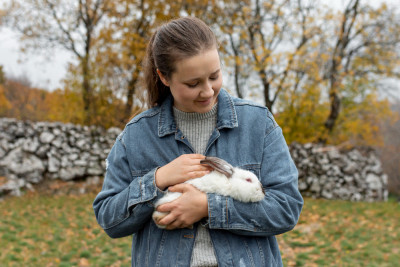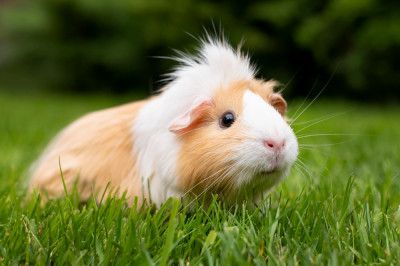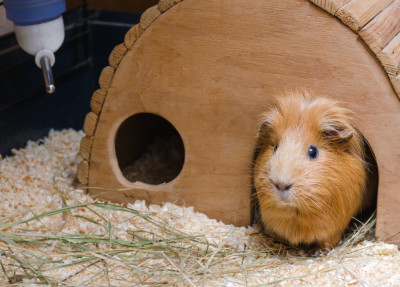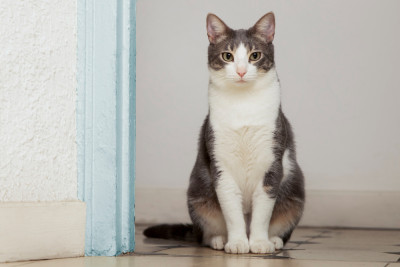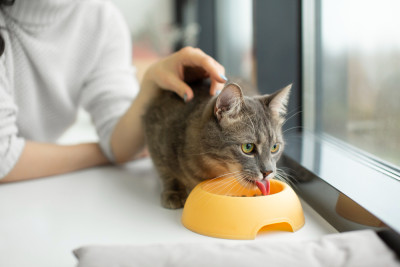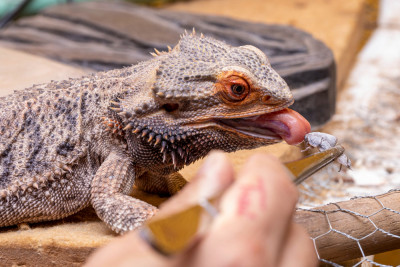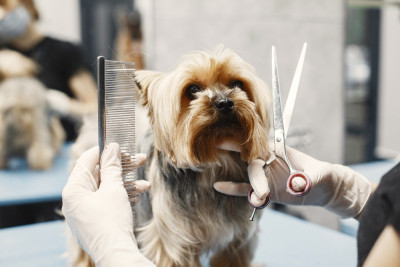1. Nutrition: The Foundation of Health
A balanced diet is the cornerstone of small mammal health. The nutritional needs of different species may vary, so it's crucial to tailor their diets accordingly:
Hamsters and Gerbils:
- Provide a commercial hamster or gerbil pellet mix as their primary diet.
- Offer fresh vegetables and fruits as occasional treats, ensuring they are safe for your pet.
- Ensure access to clean, fresh water at all times.
Guinea Pigs and Rabbits:
- Supply high-quality hay, such as timothy hay, as the primary food source. Hay is essential for dental health and digestion.
- Offer fresh, leafy greens daily, including romaine lettuce, spinach, and kale.
- Provide a small amount of commercial pellet food to supplement their diet.
- Ensure access to clean, fresh water in a drip bottle or bowl.
Ferrets:
- Offer a specialized ferret kibble that meets their dietary needs, which include high protein and fat content.
- Avoid feeding ferrets a vegetarian diet, as they are obligate carnivores.
- Fresh water should always be available.
2. Clean and Comfortable Habitat
A clean and comfortable living environment is essential for small mammal health:
-
Hamsters and Gerbils:
- Spot clean their enclosure regularly to remove waste and uneaten food.
- Change bedding every few weeks to maintain cleanliness.
- Wash and disinfect any toys or accessories as needed.
-
Guinea Pigs and Rabbits:
- Remove soiled bedding daily and replace it with fresh hay or bedding.
- Clean the entire enclosure, including food and water containers, at least once a week.
- Provide hiding spots and comfortable resting areas within the enclosure.
-
Ferrets:
- Clean the litter box daily, replacing the litter as needed.
- Wash bedding and toys regularly to prevent odors.
- Disinfect their living space to maintain hygiene.
3. Mental and Physical Stimulation
Small mammals, despite their size, are active and curious animals that require mental and physical stimulation:
-
Hamsters and Gerbils:
- Provide tunnels, hideouts, and small toys like exercise balls and chew toys.
- Create an enriching maze or obstacle course within their enclosure.
-
Guinea Pigs and Rabbits:
- Offer tunnels, hiding spots, and a variety of chew toys.
- Rotate and introduce new toys regularly to prevent boredom.
-
Ferrets:
- Incorporate hammocks, tunnels, and toys designed for ferrets.
- Allow supervised playtime outside the enclosure in a ferret-proofed area.
4. Temperature and Lighting
Small mammals are sensitive to temperature and lighting conditions. Ensure their habitat is comfortable:
-
Hamsters and Gerbils:
- Keep their environment at a consistent temperature between 65°F and 75°F (18°C to 24°C).
- Provide indirect natural light but avoid direct sunlight.
-
Guinea Pigs and Rabbits:
- Maintain a temperature range between 65°F and 75°F (18°C to 24°C).
- Guinea pigs require access to natural light for their well-being.
-
Ferrets:
- Keep their habitat between 60°F and 70°F (15°C to 21°C).
- Ferrets are sensitive to both heat and cold, so monitor the temperature carefully.
5. Regular Veterinary Care
Regular check-ups with a veterinarian who specializes in small mammals are essential for ensuring their health and well-being. Small mammals can hide signs of illness, so routine examinations help detect and address health issues promptly.
Common Health Concerns:
- Dental issues, such as overgrown teeth
- Respiratory infections
- Gastrointestinal problems
- Skin conditions
- Parasites
6. Socialization and Interaction
Some small mammals are social animals that benefit from interaction with their owners:
-
Hamsters and Gerbils:
- While they are typically solitary, daily interaction and gentle handling can help build trust and prevent stress.
-
Guinea Pigs and Rabbits:
- Both species thrive on companionship. Consider adopting a pair to prevent loneliness.
- Provide gentle handling and socialization to strengthen your bond.
-
Ferrets:
- Ferrets are highly social and playful animals that enjoy interaction with their owners.
- Plan for daily playtime outside their enclosure to satisfy their need for mental and physical stimulation.
7. Safety and Supervision
Small mammals are vulnerable to accidents and injuries. Ensure their safety and well-being by taking precautions:
-
Hamsters and Gerbils:
- Keep their enclosure secure to prevent escapes.
- Avoid housing different species together, as they may fight.
-
Guinea Pigs and Rabbits:
- Protect them from potential hazards in their environment, including toxic plants and small objects they may ingest.
- Ensure that their enclosure is escape-proof if they have outdoor playtime.
-
Ferrets:
- Ferret-proof your living space to prevent access to dangerous areas, chemicals, and small objects that they might ingest.
- Supervise them during playtime to prevent accidents.
Conclusion
Small mammals are delightful and endearing pets that enrich our lives with their unique personalities. By providing them with proper nutrition, a clean and comfortable habitat, mental and physical stimulation, regular veterinary care, socialization, and safety precautions, you can ensure the health and wellness of your small mammal companions. Remember that these pocket-sized pets rely on you for their well-being, so your dedication and care are essential for their happiness and longevity.

